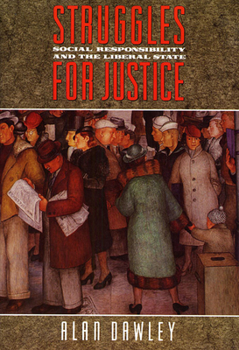Struggles for Justice: Social Responsibility and the Liberal State
Select Format
Select Condition 
Book Overview
In this new interpretation of the making of modern America, prize-winning historian Alan Dawley traces the group struggles involved in the nation's rise to power. Probing the dynamics of social change, he explores tensions between industrial workers and corporate capitalists, Victorian moralists and New Women, native Protestants and Catholic immigrants. Thoughtful analysis and sparkling narrative combine to make this book a major challenge to earlier interpretations of the period.
Format:Paperback
Language:English
ISBN:0674845811
ISBN13:9780674845817
Release Date:March 1993
Publisher:Belknap Press
Length:558 Pages
Weight:1.86 lbs.
Dimensions:1.4" x 6.0" x 9.0"
Customer Reviews
3 ratings
Wonderful analytical overview of thr 40 years that created us
Published by Thriftbooks.com User , 15 years ago
I have read a number of books on period of the first several decades of the 20th Century, the years that did most to create the American society we have today. Each book I have read fills in a little piece of the puzzle of understanding the society and politics of the time, but I have never before been able to find a single book that ties it all together - until I read Professor Dawley's book. The man has such understanding and an ability to not only describe an event of the times but to place it into the proper context. This is just a magisterial book by a man who is not only a scholar but a very wise and perceptive man. It deserves to be read by anyone interested in learning how we got to where we are today.
Why no Social Democracy in the US
Published by Thriftbooks.com User , 17 years ago
This a brilliant book, but it tries to answer the wrong question. The question he asks is: "Why was there no socialism in the US". This assumes that socialism triumphed in Europe, whereas it fell flat on its face in the US. But this is dead wrong. What triumphed in Europe was social democracy, not socialism. Social democracy in virtually every country in Europe involved a coalition of big business, big labor and big government. Big business agreed to be heavily regulated in return for large direct and indirect subsidies, protection from domestic and foreign competition and labor strife, favorable commercial codes and product liability laws. Big labor got free vocational education (so did big business), the right to bargain collectively, job protection from competition within the labor market, high wages, good pensions and liberal working hours. In return they had to settle for high personal taxes. Was this socialism? As Dawley points out, some of these themes rang through the Progressive movement, but ultimately failed. My own view is that social democracy and the Progressive movement failed in America for two main reasons. First, "the origins of American politics" has made it impossible for Americans to believe in the model of a large benign government that has the obligation to help its citisens. Second, the same deeply rooted proto-American forces have created a national mindset that tends to see all economic, political and social relations in the light of competitive and not collaborative forces. Viewed from this perspective, cooperation between labor, big business and government was just not possible. No one wanted it, except for a few Progessive era intellectuals.
As much as is possible in one book with such a broad subject
Published by Thriftbooks.com User , 24 years ago
The main problem with this book is that it tries to tie everything for over fourty years leading up to the New Deal together. It is very valuable in showing the links between progressivism and the New Deal throughout the conservatism of the twenties. A comparison of the German and American political and economic systems is also valuable as it gives the book an international perspective that is often sorely lacking in studies of American history. It would be impossible for him to make the book much longer but within its nearly 600 pages he cannot give the myriad of social movements the respect that they deserve. Overall, it can be a good springboard for furthur study or just a brief overview of this fascinating era.






